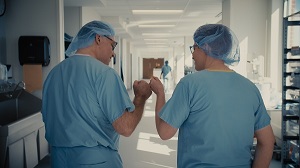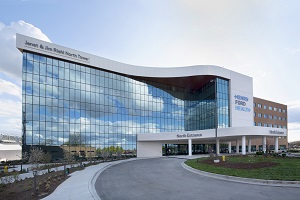
Former New Center-Area School Building to Serve Children Again
Henry Ford Health will sell the former Fairbanks Elementary School building to an autism therapy provider.
The clinicians of the Department of Anesthesiology, Pain Management & Perioperative Medicine at Henry Ford Hospital are equipped with the skills, experience, and motivation necessary to deliver the safest and highest quality care. Our mission is to meet this goal through the advancement of cutting-edge research. The department upholds a culture of mentoring, collaboration and enhanced professional development. This mandate is reflected through our values of collaboration; excellence; integrity; compassion; diversity; and innovation.
In order to meet our core mission of delivering safe, high-quality care for our patients, we closely review the medical records of all patients before they receive anesthesia. Our Surgical Optimization Clinic helps patients stabilize their chronic illnesses before going through surgery, in order to avoid complications afterwards. You'll be in great hands on the day of your procedure.
Every anesthesiologist at Henry Ford is a Board Certified or Board Eligible physician by the American Board of Anesthesiology (ABA). Our faculty members represent every major subspecialty in the field of anesthesiology including:
We follow the best available scientific literature in our treatment plans, including the use of Enhanced Recovery after Surgery (ERAS) pathways where appropriate.
While receiving anesthesia, you’ll have two experienced anesthesia providers watching over you: an anesthesiologist and either a Certified Registered Nurse Anesthetist (CRNA) or anesthesiology resident physician. We are committed to the principle embedded in a High-Reliability Organization, the goal of causing zero harm.
 To deliver safe, high quality care, we actively participate in national patient safety organizations and conduct clinical research trials. As part of the Multicenter Perioperative Outcomes Group (MPOG), we share patient safety data and best practices with other leading anesthesiology departments across the nation. We publish dozens of articles each year in international scientific journals. The department partners with medical device companies to have the most cutting-edge technologies available for our patients.
To deliver safe, high quality care, we actively participate in national patient safety organizations and conduct clinical research trials. As part of the Multicenter Perioperative Outcomes Group (MPOG), we share patient safety data and best practices with other leading anesthesiology departments across the nation. We publish dozens of articles each year in international scientific journals. The department partners with medical device companies to have the most cutting-edge technologies available for our patients.
At Henry Ford Hospital, we educate the next generation of anesthesia providers. Our department trains fifty physicians yearly as they specialize in Anesthesiology and provides advanced training programs for established anesthesiologists as they seek further subspecialty training. We serve as a core training site for the highly ranked Nurse Anesthesia program at the University of Detroit Mercy. Our expertise extends to the classroom as well. Most of our anesthesiologists are clinical faculty with Wayne State University School of Medicine. Currently we are forging a partnership with Michigan State University to establish a new Health Sciences Center on our campus in the city of Detroit.




Patient care set to begin at new $265 million ‘Janet & Jim Riehl North Tower’ later this month

Kids today spend more time online and get less face time with friends. How does that affect the development of social skills? And what can parents do?

Sea moss is touted as a weight loss cure and gut health superstar. But is it worth the hype? A dietitian explains the pros and cons of this slippery seaweed.

Severe brain trauma can have devastating effects at any age. In the past few years, the importance of protecting your brain from sports injuries has put a greater focus on proper concussion protocols.

Establishing a baseline PSA test in midlife is important to see how likely you are to develop prostate cancer in the future. But this test might not work the same way for Black men as it does for others.
We use cookies to improve your website experience. By using this site, you agree to our Terms of Use. Read our Internet Privacy Statement to learn what information we collect and how we use it.